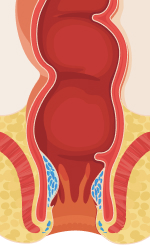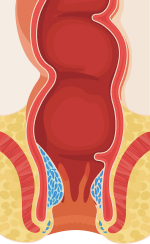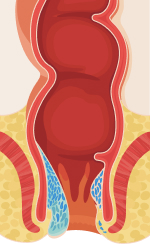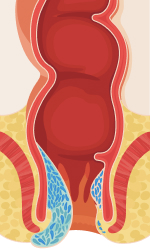Commonly referred to as Piles, hemorrhoids occur when veins in the rectum and around the anus become swollen or dilated. As blood builds up, these veins expand outward, forming hemorrhoids.
While not always visible, hemorrhoids can appear as bumps that tend to be red or discoloured and often painful or itchy.
There are several distinct types of hemorrhoids, each with varying levels of severity and danger of complication. They are categorised as follows:
Internal hemorrhoids are those found within your rectum, above the dentate. They can often go unnoticed as the rectum has no nerves that can detect pain. There are however several warning signs to look out for:
Prolapsed hemorrhoids are internal hemorrhoids that have swollen and slipped below the anal cavity. Prolapsed hemorrhoids are swollen lumps that tend to be red in colour. Though they may cause no irritation whatsoever, they can cause varying levels of pain, itching, burning and general discomfort – particularly while defecating.
Prolapsed hemorrhoids often require treatment and in some cases, may require surgery.
While internal hemorrhoids are formed by veins inside the rectum, external hemorrhoids are those formed by veins on the outer skin of the anus. They are easy to spot by the bluish colour of the veins just beneath the surface of the skin. External hemorrhoids aren’t usually serious, but they can cause some pain and discomfort that is easily treatable.
External hemorrhoids have most of the same symptoms as internal hemorrhoids, though the inflammation of the veins can cause a moderate amount of pain. Sitting down may be very uncomfortable and cleaning the anus after bowel movements can become more difficult.
Combined hemorrhoids are where both internal and external hemorrhoids occur. Combined hemorrhoids have been known to lead to additional complications. Symptoms will include all of those observed for both internal and external varieties, such as:
Combined hemorrhoids can also cause a mucous discharge, and in some cases, severe pain.
Thrombosed hemorrhoids is a type of external hemorrhoid that additionally contains a blood clot within the tissue. Thrombosis is a result of the blood being cut off by inflamed veins. The lack of blood supply to the anal and rectal tissue causes hemorrhoids to split. This will form clots and can be very serious. Some of the symptoms include:
Complications can quickly arise from thrombosed hemorrhoids, so seek treatment immediately if you are presenting symptoms.
Internal hemorrhoids can sometimes grow and protrude from the anus. When this happens, it becomes known as a prolapsed hemorrhoid and is graded as follows:

Some bleeding on bowel movements, along with itchiness and some discharge, hemorrhoids do not or prolapse.

Some bleeding on bowel movements, along with itchiness and some discharge, hemorrhoids do not or prolapse.

Hemorrhoids kept enlarging. Extends out of the anus upon defecation and will not retract unless pushed back in.

Fully prolapsed. Hemorrhoids are always outside of anus and cannot be pushed back. Persistent pain at all times. Attempting to push back will cause intense pain.
Though the exact cause is unknown, several factors are believed to increase your risk of hemorrhoids. Alongside anything that can cause the veins in the anus or rectum to dilate, some common causes can include:
Continuation of any of the things on this list can cause existing hemorrhoids to develop and cause complications to occur.
You should seek treatment if you experience any pain or discomfort in the area around your anus. Experiencing any of these symptoms while having a bowel movement is an increasing cause for concern.
If you notice any swelling or lumps near your anus, particularly with blue discolouration in the area, seek medical attention immediately. Any sort of burning sensation or extreme itching should also be brought to the attention of a medical professional without delay.
Many patients want to know how to treat hemorrhoids without surgery. Our BAZHISAN treatment is an herbal ointment combined with Naturopathic Treatment. BAZHISAN soothes pain, stops bleeding, and closes wounds to aid healing. The treatment eradicates symptoms by quickly restricting blood flow to the hemorrhoids, allowing them to detach naturally.
For severe cases, we combine naturopathic treatment with microsurgery. This is particularly effective for prolapsed hemorrhoids and those with complications. In cases where hemorrhoids have become painful and swollen and the veins around the anus have become inflamed, microsurgery is an effective method of treatment.
Sign up to receive updates, promotions, and sneak peaks of upcoming products. Plus 20% off your next order.